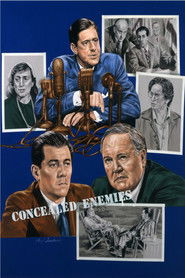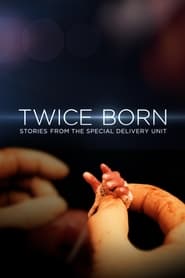Pbs TV Series - Page 33
-
Concealed Enemies
1984
Concealed Enemies
1984
Concealed Enemies is an American television docudrama of the events leading to the arrest, conviction, and imprisonment of former U.S. State Department official Alger Hiss. -
Wild Metropolis
2019
Wild Metropolis
2019
A diverse cast of animals adjust to life in the newest and fastest changing habitat on the planet -- cities -- as more and more wild animals make their home in urban areas. "Wild Metropolis" explores footage of these animals, and how they've applied their natural born skills and abilities to create their homes while also making great physical and behavioral adaptations. Narrated by Graham Vick, a wide range of species is featured, including humpback whales, megabats, penguins and Burmese pythons. -
Natural Born Hustlers
2016
When it comes to the most important goals in the animal kingdom, learning how to survive and raising the next generation are right at the top of the list. This may seem clear cut, but the lengths to which some animals go to achieve these objectives can often be downright devious. To illustrate the point, we see a shady squirrel, double-crossing cuttlefish, a conniving orchid mantis and a deceitful bird called a drongo use mimicry, disguise, and trickery to get what they want. Throughout the episodes, scientists studying animal con artists pull back the curtain on their deceptions, using their latest research to demonstrate how each of them hustles their mark. This three-part series reveals the modus operandi of some of nature’s greatest animal con artists as they outwit predators, line up their next meal, and get the girl. -
Creative Living with Sheryl Borden
0000
Creative Living with Sheryl Borden is a program airing on the Public Broadcasting Service since 1976. -
Ebert Presents: At the Movies
0000
star 8.2Ebert Presents: At the Movies was a weekly, nationally syndicated movie review television program produced and presented by film critic Roger Ebert and co-produced by his wife, Chaz Ebert. The program aired on public television stations in the United States through American Public Television. The show continued the format originated by Ebert and Gene Siskel on their first show, Sneak Previews, and continued on At the Movies with Gene Siskel and Roger Ebert and later At the Movies, in which two film critics discuss the week's new releases and occasional theme episodes, such as "The Best Films of the Year". Ebert Presents: At the Movies was hosted by Christy Lemire of the Associated Press and Ignatiy Vishnevetsky of the Chicago Reader and the website Mubi. The program premiered on January 21, 2011. -
The Joy of Painting with Nicholas Hankins: Bob Ross' Unfinished Season
2024
Nicholas Hankins brings the last paintings by Bob Ross to life. -
Inside/Out
1972
Inside/Out
1972
Inside/Out is a 1970s educational television series. The show was produced in 1972 and 1973 by the National Instructional Television Center, in association with various contributing stations, such as KETC in St. Louis, Missouri, WVIZ in Cleveland Ohio, WNVT-TV in Northern Virginia, and The Ontario Educational Communications Authority. It was one of the last programs to be produced by NIT; the organisation would be reformulated as the "Agency for Instructional Television" in April 1973. Funding for Inside/Out was provided by grants from 32 different educational agencies within the USA and Canada, with additional support from Exxon Corporation. -
Time Team America
2009
Time Team America
2009
Time Team America is an American television series that airs on PBS. It premiered on July 8, 2009. It is an Oregon Public Broadcasting adaptation of the British show Time Team, produced in collaboration with Channel 4 which commissioned the original show, in which a team of archeologists and other experts are given 72 hours to excavate an historic site. The U.S. version features "freelance and university-affiliated experts [who] mostly join existing excavations...[and] arrive with resources that the archaeologists already on the case usually can’t afford and specific questions that, if answered, will advance the understanding of the site." A second season was announced on October 18, 2011, scheduled to shoot during the summer of 2012 and to air in 2013. On December 20, 2011 it was announced that Justine Shapiro would host the second season. -
NerdTV
2005
NerdTV
2005
NerdTV is a technology TV show from PBS. NerdTV is aired; instead each episode is released as a MPEG-4 video file, freely downloadable and licensed under a Creative Commons license. Transcripts and audio-only versions of the released episodes are available as well. The show features Robert X. Cringely interviewing famous and influential nerds. Each episode is about one hour and features a single guest from the world of technology. From September 6, 2005 to November 29, 2005, thirteen episodes comprising Season One were released on the Internet. Another twelve episodes have been promised for Season Two, along with a more consistent release schedule and better quality video files. -
Shaped By Sound
2025
Shaped By Sound
2025
Shaped by Sound spotlights North Carolina’s thriving music scene, featuring artists from a broad range of genres, including indie rock, hip-hop, R&B, alt-country, jazz, bluegrass and folk. Each episode weaves a visually stunning live studio performance by an NC artist or band with an intimate conversation about their creative journey. Made possible through support from Come Hear NC, a program of the N.C. Music Office within the N.C. Department of Natural and Cultural Resources. -
Twice Born: Stories from the Special Delivery Unit
2015
This three-part miniseries steps inside the ground-breaking medical frontier of fetal surgery with an intimate look at The Special Delivery Unit at The Children's Hospital of Philadelphia, where a courageous group of doctors and their patients take on the challenges of operations done on babies still inside their mother's wombs. With exclusive access to this elite unit, the film captures rarely-seen, real-time footage of fetal operations. Meet expecting parents as they face gut-wrenching decisions: should they take a leap of faith to repair birth defects with prenatal surgery, even if it means they might lose their child? And, hear first hand from the unusual team of doctors who have defied skeptics and chosen to pursue this high-risk, high-reward career path. -
Deep Jungle
0000
Deep Jungle
0000
Deep Jungle is a three-part miniseries that originally aired on PBS on consecutive Sundays from April 17 to May 1, 2005. The miniseries is a part of the twenty-third season of the natural history documentary series Nature. Deep Jungle follows scientists and filmmakers as they use the latest technology to explore the jungles of fourteen countries around the world. -
School Inc.
2017
School Inc.
2017
Why doesn't education use innovation to grow like a successful business? Follow the late Andrew Coulson, series creator/writer/host and senior fellow of education policy at Cato Institute’s Center for Education Freedom, as he sets out on a worldwide personal quest for an answer to this question. -
Animal Attractions Television
2006
Animal Attractions Television is a television program about the deep affection people have for their pets. The show is hosted by Alex Boylan, Megan Blake and Chrishaunda Lee. This series airs on PBS stations in the US, and is funded in part by Hill's Science Diet. There were three seasons of the series, starting in 2006 and ending in 2009. -
Shakori Hills Concert Series
2016
The Shakori Hills Concert Series brings you performances from American & international music artists live from the Shakori Hills Community Arts Center in Pittsboro, North Carolina. Each week brings a new genre and a new musical experience. -
Monsterpiece Theater
1978
Monsterpiece Theater
1978
"Monsterpiece Theater" is a recurring segment on the American version of the popular children's television series Sesame Street, a parody of Masterpiece Theatre. -
Wish*a*roo Park
1999
Wish*a*roo Park
1999








